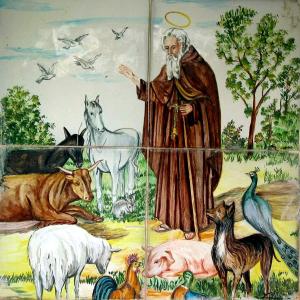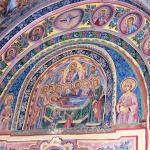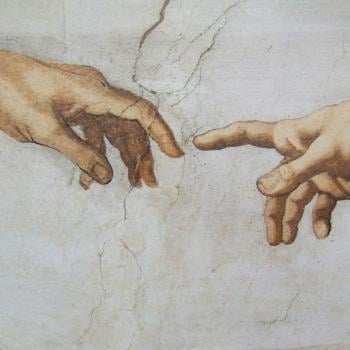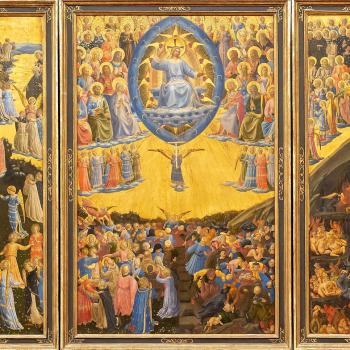
When we read from the lives of the saints, especially ascetics who lived away from society, we often find that they have interdependent relationships with animals. They treated animals with respect, and in return, animals treated them with respect. Indeed, many of them formed close bonds of friendship with the animals who lived around them, and when they did so, this was often seen as a sign of their holiness:
There was another elder at the place called Sapas whose virtue was so great that he would welcome the lions which came into his cave and feed them at his lap, so full of divine grace was this man. [1]
Ordinary people avoided wilderness spaces because of the dangerous animals which were believed to live within them. Holy men and women, instead of fearing such creatures, embraced them, developing close bonds of friendship even with the most dangerous kinds of animals they encountered. The saints and their animal companions worked for and helped each other, with the saint providing the animals all kinds of blessings and graces, while the animals, in return, often served the saints, sometimes acting as their protectors:
Out of a wish to reassure John, who had felt some slight fear, he sent, as a visible protector, an enormous and terrifying lion to protect him day and night from the plots of the wicked barbarians. The first night that he saw the lion lying beside him he naturally felt some slight fear, as he himself related to me; but when he saw that the lion followed him day and night as his inseparable companion and warded off barbarians, he offered up hymns of thanksgiving to God for not ‘releasing the staff of sinners onto the lot of the righteous.’ [2]
All manner of wild animals could, and would, become friends of the saints, as, the lives of Sts. Francis of Assisi, Seraphim of Sarov, and many others show us. Sadly, while this kind of relationship was deemed significant when looking to the lives of the saints, often was not used to encourage ordinary Christians to form similar bonds of respect with animals. Instead, Christians continued to engage them in an abusive manner, ignoring the fact that they had been charged to be stewards of the earth. Christians should act as servants protecting the earth and all its inhabitants instead of seeing them as something to use for their own pleasure. The saints shows us that we are meant to create, and can create, a graceful relationship with the rest of creation, including and especially, animals; we should make room for them, just as angels made room for us.
Sadly, so many Christians assume all kinds of things about animals, assumptions which are used to justify anything Christians want to do to them. They like to claim animals have no reason, and because of this, are not spiritual beings who have their own place in the eternal kingdom of God. It is easy to see how dangerous this kind of response is, because it is one which has not only been used to reject the good found in the rest of animal creation, but the good found in humanity itself, as racism has often been used to question the rational and spiritual capabilities of those claimed to be “lesser.” It has taken time and energy to fight such bigotry; indeed, it is a fight which continues as many racists continue to promote a version of that ideology, using pseudo-scientific means to justify their racism, such as can be seen in the work of Charles Murrary and his Bell Curve. While such an ideology needs to be confronted, so that all humanity is seen as good and equal in dignity, it is a fight which also must be had to preserve and protect the dignity of all created beings.
We need to recognize the good which is to be had in and with any form of life. We need to realize that other forms of life also possess a spiritual life of their own, and with it, one which also means they possess some level of intellect with its own reasoning skills within them. We might not be able to communicate or understand them, but this does not mean they do not possess reason, just as we know, when we encounter humans we can’t properly communicate with, that doesn’t they are unreasonable. Animals engage and understand the world in a way which accords their potentiality and the kind of life they possess; if we study them in this regard, we can begin to see they act in ways which can only be seen as reasonable (for them within their own context). From time to time, we see some who recognize this, such as when St. Salvian indicated the way animals, indeed, even insects, can work for their own future, something which would not be possible if they did not possess reason:
Why do I say this about man, when even the lowliest in the animal kingdom do everything with an eye to the future? Ants, hiding various kinds of grain from the fields in underground storerooms, drag and lay them away, because, in their desire of life, they love what they hoard. The bees, when they posit the fundaments of the honeycomb or extract their offspring from flowers, why do they seek out the thyme unless it is in their pursuit and desire of honey? Or why do they seek out certain other little flowers, unless from the love of the little bees that are to come.[3]
Similarly, modern scientists, observing and studying animals, have learned to understand them better; through their careful observations, scientists have seen how animals act with each other, and with others, with actions that indicate some level of intellectual ability, such as when some can be seen to “play dumb”:
Animals might know what others know, but sometimes it is smart to play dumb. Are animals smart enough to play dumb? Can they appraise their social situation and change their behavior depending on who is around? Yes. Wolves store and retrieve food more often when others are not looking. Rhesus monkeys will not emit food calls indicating that food is available if they are in the presence of other monkeys. And chimpanzees often ignore food, thus leading researchers to think they are dumb, only to retrieve the food when other group members are not around. It is too simplistic and anthropocentrically arrogant to assume that animals other than humans do not control their behavior according to who is watching. [4]
To play dumb requires some level of intellect, and with it, self-awareness, awareness of others, and the freedom to knowingly modify one’s own engagement with others so as to act like one possess less intellect than one has. That is, it requires a rational decision on the part of the actor, one which requires them to also determine those they are around likewise have some level of rational ability which they can use to fool them.
Animals should be seen as being spiritual beings because they are living things. Why? Because life comes from the soul, and the soul itself is not physical but spiritual. Just as it would be a fundamental error to suggest that our material being means we are merely geared towards temporality, so it is wrong to think animals, indeed, any form of life, is geared merely to temporal existence, for that dismisses their spiritual side, that is, their soul. As the destruction of a good is an evil, so the elimination of animals in the eschaton would be evil, for it would entail the elimination of their good from existence. Now, just as our eschatological fate includes self-transcendence through theosis, so animals will be transformed with their entrance into the eschaton; that is, they will experience their own transfiguration, and with it, their own theosis. Saying all of this does not undermine our unique place in the world, our unique place in salvation history, but we must understand it in the way we understand the special role Israel has in salvation history. Israel has been given a special role in history, but that roles does not undermine the way God can and does have relationships with other nations, with other peoples. The people of Israel understood this, which is why, in their Scripture, they show that there were all kinds of holy men and women found in other societies, some of which worked for and helped bless the people of Israel in their own history. We should learn this lesson and see that it should reflect the kind of relationship humanity should have with the rest of creation, recognizing God is at work, not just with us, but with all forms of life. Indeed, if we look for it, we might be able to see all kinds of holiness found in the animal world, holiness which can and does work, not just for animals, but for us as well. Is that not a part of the lesson we should learn when we read of their relationships with the saints?
[1] St. John Moschos, The Spiritual Meadow. Trans. Jon Wortley (Collegeville, MN: Cistercian Publications, 1992; repr. 2008), 5 [#2].
[2] Cyril of Scythopolis, The Lives of the Monks of Palestine. Trans. R.M. Price (Collegeville, MN: Cistercian Publications, 1991), 231 [Life of John the Hesychast].
[3] Salvian the Presbyter, “The Governance of God” in The Writings of Salvian the Presbyter. Trans. Jeremiah F. O’Sullivan (Washington, DC: CUA Press, 1962), 106.
[4] Marc Bekoff, Minding Animals: Awareness, Emotions, and Heart (Oxford: Oxford University Press, 2002), 56.
Stay in touch! Like A Little Bit of Nothing on Facebook.
If you liked what you read, please consider sharing it with your friends and family!













